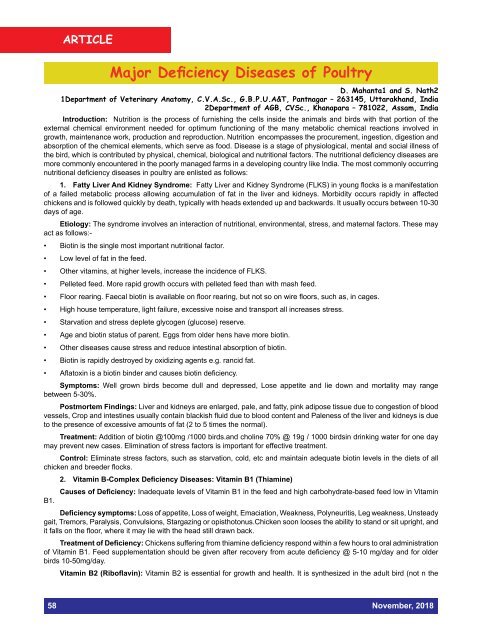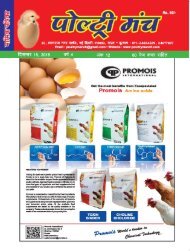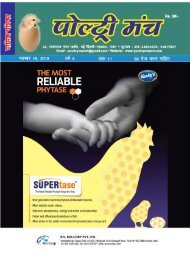November 2018 Punch PDF
You also want an ePaper? Increase the reach of your titles
YUMPU automatically turns print PDFs into web optimized ePapers that Google loves.
ARTICLE<br />
Major Deficiency Diseases of Poultry<br />
D. Mahanta1 and S. Nath2<br />
1Department of Veterinary Anatomy, C.V.A.Sc., G.B.P.U.A&T, Pantnagar – 263145, Uttarakhand, India<br />
2Department of AGB, CVSc., Khanapara – 781022, Assam, India<br />
Introduction: Nutrition is the process of furnishing the cells inside the animals and birds with that portion of the<br />
external chemical environment needed for optimum functioning of the many metabolic chemical reactions involved in<br />
growth, maintenance work, production and reproduction. Nutrition encompasses the procurement, ingestion, digestion and<br />
absorption of the chemical elements, which serve as food. Disease is a stage of physiological, mental and social illness of<br />
the bird, which is contributed by physical, chemical, biological and nutritional factors. The nutritional deficiency diseases are<br />
more commonly encountered in the poorly managed farms in a developing country like India. The most commonly occurring<br />
nutritional deficiency diseases in poultry are enlisted as follows:<br />
1. Fatty Liver And Kidney Syndrome: Fatty Liver and Kidney Syndrome (FLKS) in young flocks is a manifestation<br />
of a failed metabolic process allowing accumulation of fat in the liver and kidneys. Morbidity occurs rapidly in affected<br />
chickens and is followed quickly by death, typically with heads extended up and backwards. It usually occurs between 10-30<br />
days of age.<br />
Etiology: The syndrome involves an interaction of nutritional, environmental, stress, and maternal factors. These may<br />
act as follows:-<br />
• Biotin is the single most important nutritional factor.<br />
• Low level of fat in the feed.<br />
• Other vitamins, at higher levels, increase the incidence of FLKS.<br />
• Pelleted feed. More rapid growth occurs with pelleted feed than with mash feed.<br />
• Floor rearing. Faecal biotin is available on floor rearing, but not so on wire floors, such as, in cages.<br />
• High house temperature, light failure, excessive noise and transport all increases stress.<br />
• Starvation and stress deplete glycogen (glucose) reserve.<br />
• Age and biotin status of parent. Eggs from older hens have more biotin.<br />
• Other diseases cause stress and reduce intestinal absorption of biotin.<br />
• Biotin is rapidly destroyed by oxidizing agents e.g. rancid fat.<br />
• Aflatoxin is a biotin binder and causes biotin deficiency.<br />
Symptoms: Well grown birds become dull and depressed, Lose appetite and lie down and mortality may range<br />
between 5-30%.<br />
Postmortem Findings: Liver and kidneys are enlarged, pale, and fatty, pink adipose tissue due to congestion of blood<br />
vessels, Crop and intestines usually contain blackish fluid due to blood content and Paleness of the liver and kidneys is due<br />
to the presence of excessive amounts of fat (2 to 5 times the normal).<br />
Treatment: Addition of biotin @100mg /1000 birds.and choline 70% @ 19g / 1000 birdsin drinking water for one day<br />
may prevent new cases. Elimination of stress factors is important for effective treatment.<br />
Control: Eliminate stress factors, such as starvation, cold, etc and maintain adequate biotin levels in the diets of all<br />
chicken and breeder flocks.<br />
2. Vitamin B-Complex Deficiency Diseases: Vitamin B1 (Thiamine)<br />
Causes of Deficiency: Inadequate levels of Vitamin B1 in the feed and high carbohydrate-based feed low in Vitamin<br />
B1.<br />
Deficiency symptoms: Loss of appetite, Loss of weight, Emaciation, Weakness, Polyneuritis, Leg weakness, Unsteady<br />
gait, Tremors, Paralysis, Convulsions, Stargazing or opisthotonus.Chicken soon looses the ability to stand or sit upright, and<br />
it falls on the floor, where it may lie with the head still drawn back.<br />
Treatment of Deficiency: Chickens suffering from thiamine deficiency respond within a few hours to oral administration<br />
of Vitamin B1. Feed supplementation should be given after recovery from acute deficiency @ 5-10 mg/day and for older<br />
birds 10-50mg/day.<br />
Vitamin B2 (Riboflavin): Vitamin B2 is essential for growth and health. It is synthesized in the adult bird (not n the<br />
58 <strong>November</strong>, <strong>2018</strong>





